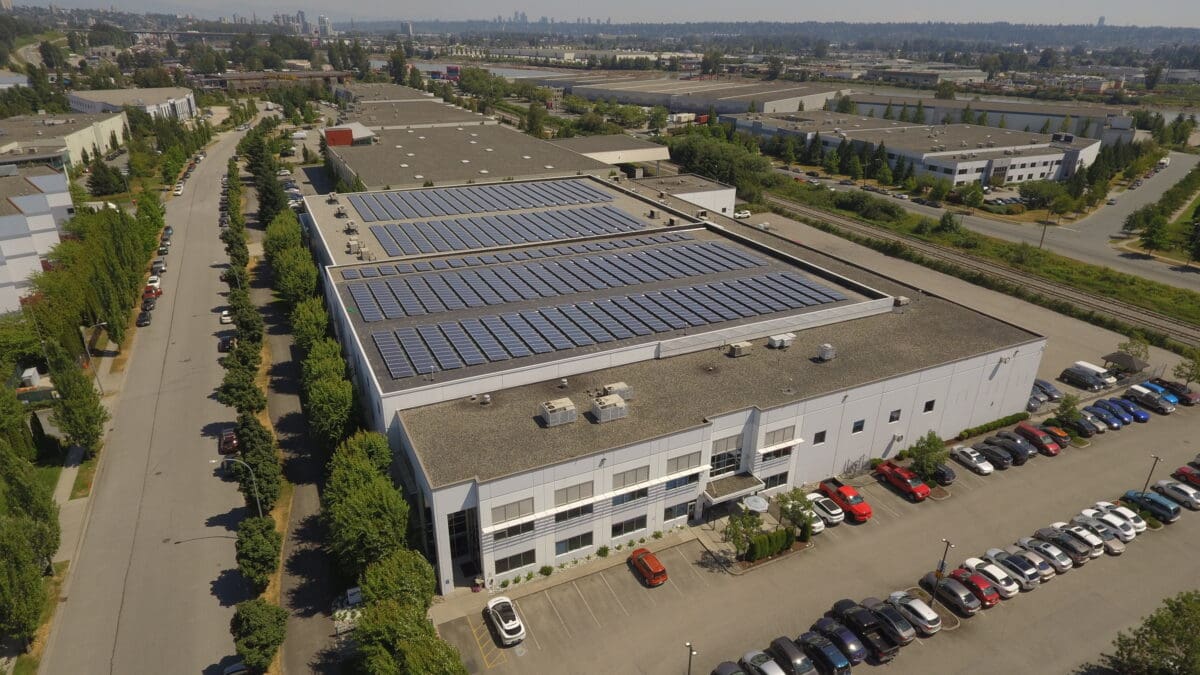How many solar panels are needed to charge an EV?
Charging your EV with solar panels is a great way to save money and reduce your carbon footprint; you’re literally driving on sunshine! But how many solar panels do you need to charge your EV and to offset your annual driving costs? That comes down to a few quick calculations.
Before we jump into the numbers, if you are new to considering solar panels for your home, be sure to read our article on the Top 5 Questions to Ask Before Installing Solar Panels.
Driving an electric vehicle (EV) is a great way to save on fuel costs while also helping reduce greenhouse gas emissions. To accurately estimate how many solar panels are needed to charge your EV, we must determine the following:
- How much does electricity cost?
- How many kilometers do you drive per year?
- What range does your EV battery have?
- How many kilowatt-hours does it takes to charge your EV?
The current cost for BC Hydro supplied electricity is 9.50* cents per kWh (Step 1) for first 22.1918 kWh per day (or ~8100 kWh per year) and 14.08* cents (Step 2) for any additional power. The average house uses over 11,135 kWh per year and is already well into the expensive Step 2 rate. Adding an electric car usually means all of what the car consumes would be at the Step 2 rate (14.08 cents per kWh).
Let’s compare a few different EVs, assuming you drive 37 kilometers per day including weekends. Over a year, that’s nearly 13,100 kilometers, which is the average annual mileage driven by British Columbians. Below are specs for some of the most popular EV’s currently on the market, along with the number of solar panels required to charge each vehicle.
| Vehicle Model | Range (Km) | Total Battery kWh | kWh / 100Km | Total Annual kWh to Drive EV | # Solar Panels Needed |
| Audi e-tron GT | 383 | 93 | 24.3 | 3180.9 | 7.1 |
| BMW i4 | 484 | 83 | 17.1 | 2246.5 | 5.0 |
| Chevrolet Bolt | 417 | 65 | 15.6 | 2042.0 | 4.5 |
| Ford F-150 Lightning | 370 | 98 | 26.5 | 3469.7 | 7.7 |
| Hyundai Ioniq 5 | 354 | 58 | 16.4 | 2146.3 | 4.8 |
| Hyundai Kona | 415 | 64 | 15.4 | 2020.2 | 4.5 |
| Kia Soul | 383 | 64 | 16.7 | 2189.0 | 4.9 |
| Mini Cooper | 183 | 32 | 17.5 | 2290.7 | 5.1 |
| Mustang Mach E | 360 | 68 | 18.9 | 2474.4 | 5.5 |
| Nissan Leaf | 240 | 40 | 16.7 | 2183.3 | 4.9 |
| Polestar | 435 | 78 | 17.9 | 2349.0 | 5.2 |
| Porsche Taycan | 320 | 79 | 24.7 | 3234.1 | 7.2 |
| Rivian R1T | 505 | 135 | 26.7 | 3502.0 | 7.8 |
| Tesla Model 3 | 438 | 60 | 13.7 | 1794.5 | 4.0 |
| Tesla Model S | 652 | 100 | 15.3 | 2009.2 | 4.5 |
| Tesla Model S Plaid | 637 | 100 | 15.7 | 2056.5 | 4.6 |
| Tesla Model X | 560 | 100 | 17.9 | 2339.3 | 5.2 |
| Tesla Model X Plaid | 536 | 100 | 18.7 | 2444.0 | 5.4 |
| Tesla Model Y | 531 | 80 | 15.1 | 1973.6 | 4.4 |
The Tesla Model 3 requires 4 (rounded up from 3.3) solar panels at 450 watts each to charge the EV for the entire year.
Similarly, the Ford F-150 Lightning requires 7 (rounded up from 6.5) solar panels at 450 watts each to charge the EV for an entire year. A solar array of this size would need 110 square feet of roof space.
The average British Columbian spends $2,560 per year on fuel at the pumps per vehicle. This is based on an average cost of $1.955 per liter, which we expect to be higher in the upcoming years. What does that mean in terms of the cost to charge an EV vehicle for an entire year:
| Vehicle Model | Cost to Charge from Grid* | Cost to Charge from Solar** |
| Audi e-tron GT | $448 | $0 |
| BMW i4 | $316 | $0 |
| Chevrolet Bolt | $288 | $0 |
| Ford F-150 Lightning | $489 | $0 |
| Hyundai Ioniq 5 | $302 | $0 |
| Hyundai Kona | $284 | $0 |
| Kia Soul | $308 | $0 |
| Mini Cooper | $323 | $0 |
| Mustang Mach E | $348 | $0 |
| Nissan Leaf | $307 | $0 |
| Polestar | $331 | $0 |
| Porsche Taycan | $455 | $0 |
| Rivian R1T | $493 | $0 |
| Tesla Model 3 | $253 | $0 |
| Tesla Model S | $283 | $0 |
| Tesla Model S Plaid | $290 | $0 |
| Tesla Model X | $329 | $0 |
| Tesla Model X Plaid | $344 | $0 |
| Tesla Model Y | $278 | $0 |
When planning a solar installation that offsets the cost of your electric vehicle, customers often look at other high electricity consumption areas of their home, like heat pumps, swimming pools or hot tubs, that can also be offset by solar power to have a more dramatic impact of reducing their electricity bill. Our experts can provide you a Free Customized Estimate showing how you can cover the electricity cost of your EV with solar panels, along with a whole home solution.
Do you want to save even more on your solar installation? Make sure to apply for your $5,000 Canada Greener Homes Grant!
A Penfolds’ solar installation with a 30-year warranty means you can enjoy saving money on your BC Hydro bills and at the gas pump … all while driving an electric vehicle fueled by sunshine for decades!
*BC Hydro rates as of March 2023 **Savings are after the cost of the initial investment.


